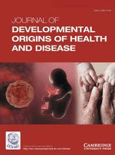
Journal of Developmental Origins of Health and Disease
metrics 2024
Transforming Understanding of Health Through Developmental Science
Introduction
The Journal of Developmental Origins of Health and Disease is a premier academic publication under the esteemed Cambridge University Press, dedicated to advancing the understanding of how developmental processes influence health outcomes across the lifespan. With an ISSN of 2040-1744 and an E-ISSN of 2040-1752, this journal has established itself as a critical resource in the field of medicine, currently positioned in the Q2 category of Medicine (miscellaneous). Having converged from 2010 to 2024, this journal reflects a significant commitment to exploring the interconnections between early development and subsequent health conditions. Ranked 147 out of 398 in its category according to Scopus, it retains a commendable 63rd percentile status, highlighting its contributions to this rapidly evolving field. Though it does not offer open access, the journal remains a vital platform for researchers, professionals, and students interested in uncovering the intricate links between developmental biology and public health challenges.
Metrics 2024
 0.66
0.66 1.80
1.80 2.00
2.00 44
44Metrics History
Rank 2024
Scopus
IF (Web Of Science)
JCI (Web Of Science)
Quartile History
Similar Journals
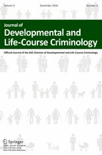
Journal of Developmental and Life-Course Criminology
Bridging Disciplines for a Deeper Understanding of CrimeThe Journal of Developmental and Life-Course Criminology, published by Springer International Publishing AG, stands as a vital resource in the interdisciplinary fields of criminology, psychology, and social sciences. With an ISSN of 2199-4641 and an E-ISSN of 2199-465X, this journal provides a platform for high-quality research that examines the intricate relationships between developmental pathways and criminological outcomes. The journal has been recognized with impressive rankings, categorized as Q2 in Applied Psychology, Q1 in Law, and Q2 in Life-span and Life-course Studies for 2023, reflecting its significance in advancing knowledge within these domains. With Scopus rankings placing it within the top percentiles, it offers a unique Open Access option, making research widely accessible to scholars, practitioners, and students seeking insights into the lifecycle approach to crime and justice. Operating from Switzerland at Gewerbestrasse 11, Cham CH-6330, Switzerland, the journal aims to foster scholarly communication and meaningful discourse on pivotal issues pertaining to developmental criminology from 2015 through 2024 and beyond.
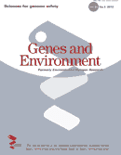
Genes and Environment
Transforming Research into Policy for Healthier FuturesGenes and Environment is a premier interdisciplinary journal published by BMC that explores the dynamic interplay between genetic factors and environmental influences shaping health and behavior. Since its inception, the journal has gained recognition for its commitment to providing open access (since 2015) to groundbreaking research, fostering an inclusive platform for scholars worldwide. With an ISSN of 1880-7046 and an E-ISSN of 1880-7062, Genes and Environment consistently ranks in Q2 in Environmental Science, Q3 in Genetics, and Q2 in Social Psychology according to the 2023 category quartiles, highlighting its significant contributions to these fields. The journal is headquartered in the United Kingdom and has a diverse portfolio of research spanning from 2006 to 2024. It is recognized in Scopus with commendable rankings across various disciplines. By fostering dialogue among researchers, professionals, and students, Genes and Environment serves as a vital resource for understanding complex biological interactions with environmental factors, ultimately aiming to advance knowledge and inform public policy.

DEVELOPMENT AND PSYCHOPATHOLOGY
Illuminating the Pathways of Developmental PsychologyDEVELOPMENT AND PSYCHOPATHOLOGY is a leading journal published by Cambridge University Press, focusing on the intricate interplay between developmental processes and psychopathological outcomes. With a prestigious position in quartile Q1 for both Developmental and Educational Psychology and Psychiatry and Mental Health, this journal continues to set the standard for rigorous research contributions. The journal aims to disseminate high-quality empirical studies, theoretical discussions, and methodological innovations relevant to understanding the complexities of human development and its relation to mental health. Spanning a broad scope, it serves as a vital resource for researchers, clinicians, and policymakers seeking to advance knowledge in these critical fields. Through its commitment to fostering interdisciplinary dialogues, DEVELOPMENT AND PSYCHOPATHOLOGY plays a pivotal role in shaping future research directions and clinical practices. The journal is accessible to a global audience, striving to enhance the visibility of research that addresses the pressing issues of developmental psychology and mental health.

Developmental Cognitive Neuroscience
Fostering innovation in the study of developmental neuroscience.Developmental Cognitive Neuroscience is a leading interdisciplinary journal published by ELSEVIER SCI LTD, dedicated to advancing the field of cognitive neuroscience with a specific focus on the developmental aspects of brain function and behavior. Since its inception in 2011, this Open Access journal has continued to thrive, gaining significant recognition with a remarkable impact factor that places it in the Q1 category of cognitive neuroscience, ranking 22nd out of 115 in Scopus. This enhances its visibility and accessibility to a global audience, including researchers, clinicians, and students keen on exploring the intricate relationship between cognitive development and neurological processes. The journal embraces a wide array of topics, from the impact of early life experiences on cognitive outcomes to neurodevelopmental disorders, fostering an enriching platform for disseminating high-quality research and innovative findings. As it progresses towards 2024, Developmental Cognitive Neuroscience remains pivotal in shaping future research and understanding in the field.

Biology of Sex Differences
Bridging Biology and Gender: A Global DialogueBiology of Sex Differences is an esteemed open access journal published by BMC that has been at the forefront of research since its inception in 2010. Focused on the intricate biological aspects of sex differences, this journal serves as a vital resource for researchers and professionals within the fields of Endocrinology and Gender Studies. With a remarkable impact factor and consistently high rankings—achieving Q1 status for both Endocrinology and Gender Studies in 2023—this journal is widely recognized for its contribution to advancing knowledge in these critical areas. The journal is based in the United Kingdom, reflecting its commitment to fostering global dialogue among scientists and scholars. With its open access model, Biology of Sex Differences ensures that cutting-edge research is accessible to a diverse audience, promoting collaboration and innovation. By encompassing a broad scope of topics related to the biological underpinnings of sex differences, this journal is essential for anyone looking to understand the complex interplay between biology and gender.

SALUD PUBLICA DE MEXICO
Unlocking Access to Pioneering Health ResearchSALUD PUBLICA DE MEXICO is a prestigious journal published by the Instituto Nacional de Salud Pública, recognized for its significant contributions to the fields of Public Health, Environmental and Occupational Health since its inception in 1961. With an ISSN of 0036-3634 and E-ISSN 1606-7916, this open-access journal has allowed researchers and practitioners to access valuable insights and empirical findings without barriers since 1997. Based in Cuernavaca, Morelos, Mexico, it serves as a vital platform for disseminating critical health-related research and policy analyses relevant to the Latin American context and beyond. In the 2023 Scopus rankings, it stands in the Q2 quartile, indicating its robust academic impact, and ranks #313 out of 665 in its category, placing it in the 53rd percentile. The journal's ongoing commitment to public health and its collaborative research ethos make it an essential resource for professionals, researchers, and students striving to advance public health knowledge and practice.
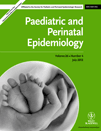
PAEDIATRIC AND PERINATAL EPIDEMIOLOGY
Shaping Evidence-Based Practices in PediatricsPAEDIATRIC AND PERINATAL EPIDEMIOLOGY is a premier journal in the field of epidemiology, published by WILEY. Established in 1987, it provides an invaluable forum for researchers, professionals, and students interested in the intersections of pediatric health and perinatal epidemiology. With its strong reputation, the journal holds a distinguished Q2 ranking in Epidemiology and a Q1 ranking in Pediatrics, Perinatology, and Child Health as of 2023, indicating its influential role in advancing knowledge and practice. The journal is indexed in Scopus, boasting impressive rankings, including Rank #52 out of 330 in Pediatrics, with an 84th percentile standing, demonstrating its significant impact in the field. Although not an Open Access journal, PAEDIATRIC AND PERINATAL EPIDEMIOLOGY equips its readers with high-quality research aimed at improving child and maternal health outcomes, making it a vital resource for anyone committed to advancing public health in these critical areas.
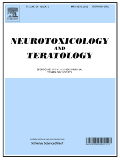
NEUROTOXICOLOGY AND TERATOLOGY
Empowering researchers with vital knowledge in neurotoxicology.NEUROTOXICOLOGY AND TERATOLOGY, published by PERGAMON-ELSEVIER SCIENCE LTD, is a premier journal dedicated to advancing knowledge in the critical fields of neuroscience and toxicology. With a focus on the mechanisms of neurotoxic effects and developmental disturbances, this journal serves as a vital resource for researchers, practitioners, and students committed to understanding the complexities of neurotoxicology and its implications for human health. The journal boasts a solid impact factor and holds esteemed quartile rankings, being classified as Q3 in both Cellular and Molecular Neuroscience and Developmental Neuroscience, and Q2 in Toxicology as of 2023. Despite being a subscription-based journal, NEUROTOXICOLOGY AND TERATOLOGY is recognized for its authoritative peer-reviewed articles that encompass a broad spectrum of research from 1987 to 2024, making it indispensable for those who seek in-depth knowledge and current scientific discourse in the field. Its impactful position within Scopus rankings underlines its importance, with notable placement across various neuroscience and toxicology categories.
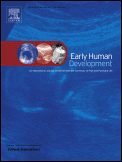
EARLY HUMAN DEVELOPMENT
Exploring the critical stages of early human development.EARLY HUMAN DEVELOPMENT is a prestigious journal dedicated to advancing knowledge in the vital fields of Obstetrics and Gynecology as well as Pediatrics, Perinatology, and Child Health. Published by Elsevier Ireland Ltd, this journal has established itself as an essential resource for researchers and practitioners focusing on early life development. With an impressive ranking in the Q1 category for Pediatrics and Q2 for Obstetrics and Gynecology, it provides a platform for high-quality research that informs clinical practice and policy. The journal spans from 1977 to 2024, reflecting over four decades of scholarly contributions. Although currently not open access, the robust impact factor and strong Scopus rankings, including a 76th percentile in Pediatrics, ensure it remains a critical asset for professionals aiming to stay at the forefront of advancements in maternal and child health. Through its curated articles, EARLY HUMAN DEVELOPMENT aims to promote interdisciplinary collaboration and foster innovative research that ultimately enhances the health and development of children worldwide.

MOLECULAR REPRODUCTION AND DEVELOPMENT
Pioneering research for a deeper understanding of life.MOLECULAR REPRODUCTION AND DEVELOPMENT is a prestigious peer-reviewed journal published by WILEY, specializing in the intricate domains of Cell Biology, Developmental Biology, and Genetics. Since its inception in 1988, this journal has been a vital platform for disseminating pioneering research and innovative methodologies that advance our understanding of molecular mechanisms driving reproduction and development. With a current impact factor reflective of its significance in the field, MOLECULAR REPRODUCTION AND DEVELOPMENT is ranked Q3 in both Cell Biology and Developmental Biology, and Q2 in Genetics, underscoring its relevance and scholarly contribution. Catering to a diverse audience of researchers, professionals, and students, this journal not only showcases cutting-edge findings but also aims to foster interdisciplinary exchanges that enhance scientific collaboration. By exploring critical biological processes, it ultimately contributes to the broader understanding of health and disease in various organisms, making it an essential resource for anyone dedicated to the life sciences.